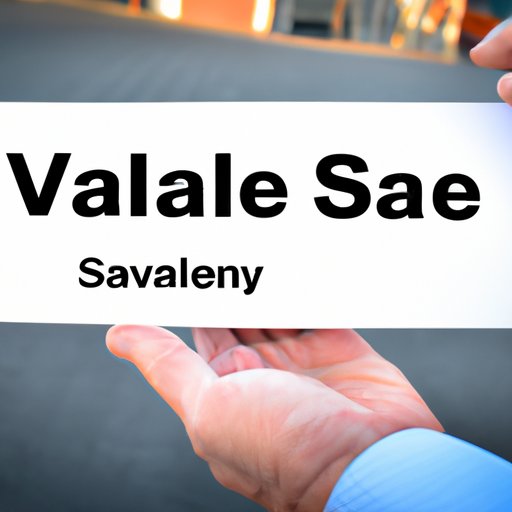Introduction
When it comes to buying or selling a business, valuing the company is a critical part of the process. Whether you’re the seller trying to maximize profits, or the buyer looking for a good deal, both parties need to come to an agreement on the actual value of the business. However, determining a business’s value can be tricky, as there are many factors that need to be taken into consideration.
The purpose of this article is to provide a comprehensive guide on how to value a business for sale. It will cover researching the market value of similar businesses, calculating assets and liabilities, considering earnings and cash flow, factoring in goodwill, and seeking professional advice. This article is intended for anyone looking to buy or sell a business, as well as individuals interested in learning more about business valuation.
Research the Market Value of Similar Businesses
The first step in determining the value of a business is to research the market value of comparable businesses. Start by looking at past sales and current listings of similar businesses. Analyze the asking prices of these companies, taking note of any features or attributes that could affect their worth. This will give you an idea of what buyers might be willing to pay for your own business.
In addition to looking at current listings, it’s also important to consider the sale prices of similar businesses that have recently been sold. According to small business expert, John Rampton, “The best way to get an accurate estimate is to look at what similar businesses were sold for in the recent past. The more data points you have, the better.” By researching the sale prices of similar businesses, you can get a realistic idea of the market value of your own business.
Calculate Assets and Liabilities
Once you’ve done research on the market value of comparable businesses, the next step is to calculate the assets and liabilities of your own business. Take inventory of all assets, such as equipment, property, and inventory, and determine their relative worth. Then, do the same for any liabilities, such as loans, debts, and other financial obligations. This will give you a clear picture of the total value of your business.
It’s important to remember that the value of a business is not just based on its tangible assets. According to Forbes contributor, Ken Krogue, “Many times, the intangible assets of a company—such as brand recognition, customer loyalty, patents, copyrights, and trademarks—are actually more valuable than the tangible assets.” When calculating the value of your business, make sure to take into account any intangible assets as well.

Consider Earnings and Cash Flow
In addition to calculating assets and liabilities, it’s also important to consider the business’s earnings and cash flow. Evaluate the business’s historical cash flow and earnings, as well as its potential for future profitability. This will give you an idea of the company’s true value, as buyers will likely be more interested in a business with higher earning potential.
It’s also important to factor in any taxes or fees associated with the sale of the business. According to Entrepreneur Magazine, “Be sure to factor in any taxes or fees associated with the sale of the business. Depending on the type of business, there may be capital gains taxes, transfer taxes, or other applicable fees.” Taking these costs into account will help ensure that you get an accurate assessment of the business’s value.
Factor in Goodwill
Another important factor to consider when valuing a business is goodwill. Goodwill is the intangible value of a business, which includes things like reputation, brand recognition, and customer loyalty. Goodwill can significantly increase the value of a business, so it’s important to factor it in when assessing the company’s worth.
According to Investopedia, “Goodwill is a company’s reputation, customer base, and intellectual property, including patents, trademarks, and copyrights. All of these factors can contribute to a company’s overall value and should be taken into consideration when valuing a business.” If a business has strong goodwill, it could be worth significantly more than its tangible assets alone.
Seek Professional Advice
Finally, it’s important to seek professional advice when valuing a business. A qualified accountant or business valuator can help ensure that you get an accurate assessment of the company’s value. They can also help identify any potential issues or problems that could affect the business’s worth.
According to business consultant, Brad Egeland, “Seeking professional help is always a wise move when valuing a business. A knowledgeable third party can provide valuable insights and help you avoid making costly mistakes.” Getting professional advice can help you make sure that you get an accurate assessment of the business’s value.
Conclusion
Valuing a business for sale can be a complex process. It requires research of the market value of similar businesses, calculating assets and liabilities, considering earnings and cash flow, factoring in goodwill, and seeking professional advice. By following these steps, you can ensure that you get an accurate assessment of the business’s value.
Ultimately, determining the value of a business is an important part of the buying or selling process. By following the steps outlined in this article, you can ensure that you get an accurate assessment of the business’s value. With the right information and guidance, you can make sure that you get the best deal possible.
(Note: Is this article not meeting your expectations? Do you have knowledge or insights to share? Unlock new opportunities and expand your reach by joining our authors team. Click Registration to join us and share your expertise with our readers.)
